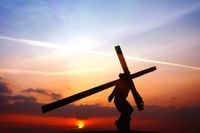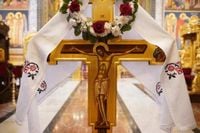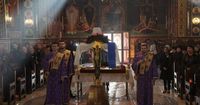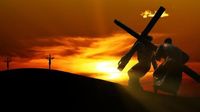As Orthodox Christians around the world enter Holy Week, also known as Great Week, from April 13 to April 20, 2025, they prepare for the significant celebration of the Resurrection. This week is marked by deep reflection and solemnity, commemorating the last days of Jesus Christ on Earth before his crucifixion. Each day of this week holds special significance, with church services known as Denii held to honor these moments.
During Holy Week, the atmosphere in Orthodox churches is one of reverence and introspection. The faithful are encouraged to engage in sincere repentance and reflection on the suffering of Christ. Special services take place each evening, culminating in the major events of Great Thursday and Great Friday, which are particularly significant.
On Great Thursday, the Denia of the 12 Gospels is celebrated, featuring twelve readings from the New Testament that recount the arrest, trial, and crucifixion of Jesus Christ. This service is a powerful reminder of the events leading to the crucifixion, as believers reflect on the depth of Christ's sacrifice. Great Friday is marked by the Denia of the Epitaph of the Lord, a service that includes hymns divided into three stations, detailing the passions, crucifixion, death, and burial of the Savior.
In regions like Maramureș, it is customary for people to wear mourning clothes during this week, emphasizing the spiritual mourning associated with the sufferings of the Lord. Many believers opt for a complete fast, particularly on Great Friday, further deepening their spiritual experience.
Each day of Holy Week has its own unique significance:
Monday introduces the story of Joseph, who was sold by his brothers in Egypt. This narrative serves as a prefiguration of Christ’s betrayal by Judas.
Tuesday is dedicated to the Parable of the Ten Virgins, which emphasizes the importance of vigilance and spiritual preparedness. Known colloquially as “Dry Tuesday,” this day serves as a metaphor for the necessity of being spiritually awake in anticipation of the divine bridegroom.
Wednesday recalls the sinful woman who washed Christ's feet with tears and anointed them with myrrh, symbolizing true repentance and divine forgiveness. This day also acknowledges Judas's betrayal, who sold Christ for thirty pieces of silver.
Great Thursday focuses on four key events in Jesus's life: the washing of the disciples' feet, the Last Supper, the high priestly prayer, and the beginning of his sufferings through his arrest in the Garden of Gethsemane. The Denia of the 12 Gospels takes place on this day, with a liturgical marathon of biblical readings that detail the steps leading to Christ's crucifixion.
Great Friday is a day of mourning, where the entire Christian world commemorates the Crucifixion of Christ. It is a day devoid of the Divine Liturgy, dedicated instead to silence and reflection. The Denia of the Epitaph of the Lord is held, where mournful hymns are sung, reflecting on the sufferings, death, and burial of Christ. Many choose to fast completely, and in some areas, the faithful pass under the Holy Epitaph as a symbolic act of purification.
Great Saturday is a day of anticipation, celebrating the burial of Jesus Christ and His descent into hell to bring light to the departed. The service culminates at midnight with the Resurrection, where believers gather outside churches, receive the holy light, and proclaim, “Christ is Risen!”
This year, the celebration of Orthodox Easter coincides with Catholic Easter on April 20, 2025, a rare synchronization that has not occurred since 2017. The date of Easter is determined by the first full moon following the spring equinox, making this coincidence particularly significant for both traditions.
The celebration of Easter is not merely a commemoration of a past event but a profound celebration of life triumphing over death, light over darkness, and love over sin. As the faithful gather to celebrate, the essence of the holiday is felt deeply in the hearts of all who partake in the rituals and traditions that define this sacred time.
In summary, Holy Week serves as a vital period of reflection, preparation, and spiritual renewal for Orthodox Christians. The events of each day lead to the culmination of Easter, marking one of the most important celebrations in the Christian calendar.








